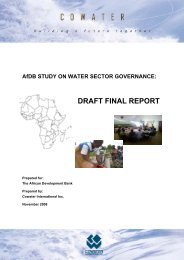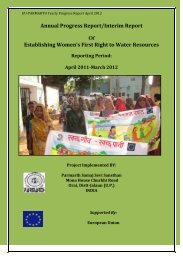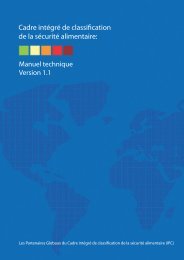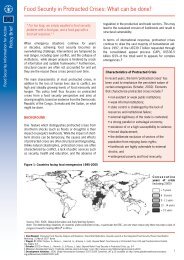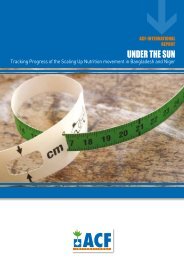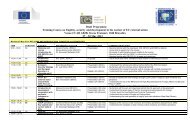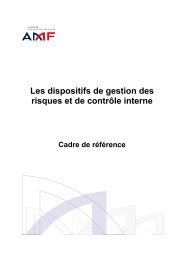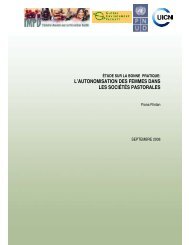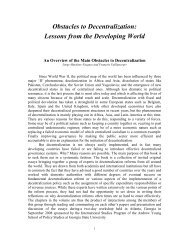Extraction Technologies for Medicinal and Aromatic ... - Capacity4Dev
Extraction Technologies for Medicinal and Aromatic ... - Capacity4Dev
Extraction Technologies for Medicinal and Aromatic ... - Capacity4Dev
You also want an ePaper? Increase the reach of your titles
YUMPU automatically turns print PDFs into web optimized ePapers that Google loves.
EXTRACTION TECHNOLOGIES FOR MEDICINAL AND AROMATIC PLANTS<br />
11 Process-scale High Per<strong>for</strong>mance Liquid<br />
Chromatography <strong>for</strong> <strong>Medicinal</strong> <strong>and</strong><br />
<strong>Aromatic</strong> Plants<br />
Abstract<br />
M. M. Gupta <strong>and</strong> K. Shanker<br />
High per<strong>for</strong>mance liquid chromatography (HPLC) is widely used by chromatographers<br />
<strong>and</strong> by the pharmaceutical industry <strong>for</strong> the accurate <strong>and</strong> precise analysis of chemicals<br />
<strong>and</strong> drugs of diverse nature. The systematic scale-up from analytical to preparative<br />
<strong>and</strong> process scale <strong>and</strong> further scale-up to industrial scale can be used in the medicinal<br />
<strong>and</strong> aromatic plant industry <strong>for</strong> the isolation <strong>and</strong> purifi cation of phytomolecules of<br />
therapeutic <strong>and</strong> commercial interest. Due to the gradual increase in the dem<strong>and</strong> <strong>for</strong><br />
phytomolecules, the importance of process-scale HPLC as a purifi cation tool has been<br />
increasing. In this article, we discuss the practical aspects of process-scale HPLC <strong>and</strong><br />
focus on terminology, operational problems, advantages <strong>and</strong> applications of this technology<br />
to medicinal <strong>and</strong> aromatic plants.<br />
11.1 Introduction<br />
The term liquid chromatography (LC) refers to a range of chromatographic<br />
systems, indicating liquid-solid, liquid-liquid, ion-exchange <strong>and</strong><br />
size exclusion chromatography. Glass column chromatography is an example<br />
of classic liquid column chromatography in which the mobile phase percolates<br />
under gravity through a glass column fi lled with a fi nely divided stationary<br />
phase. Liquid chromatography has overtaken gas chromatography,<br />
as high per<strong>for</strong>mance liquid chromatography (HPLC) systems now provide<br />
features such as:<br />
i)<br />
ii)<br />
iii)<br />
iv)<br />
v)<br />
High resolving power<br />
Fast separation<br />
Continuous monitoring of column effl uent<br />
Qualitative <strong>and</strong> quantitative measurements <strong>and</strong> isolation<br />
Automation of analytical procedures <strong>and</strong> data h<strong>and</strong>ling<br />
There has been tremendous growth in this technique since<br />
1964 when the fi rst HPLC instrument was constructed by Csaba Horvath<br />
at Yale University. For the isolation of compounds, preparative mode HPLC<br />
(prep-HPLC) can be used in pharmaceutical development <strong>for</strong> trouble-shooting<br />
purposes or as part of a systematic scale-up process. The importance<br />
of prep-HPLC in pharmaceutical production as a purifi cation tool has been<br />
increasing. Chromatographic separation can remove impurities of different<br />
polarity <strong>and</strong> can reduce the content of an enantiomer in a racemic mixture.<br />
In both of these instances, crystallization may be used to prepare the pure<br />
product. Bench to pilot scale production of natural products needs some<br />
181



